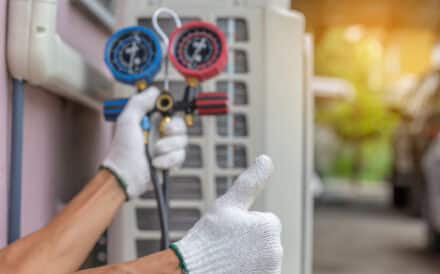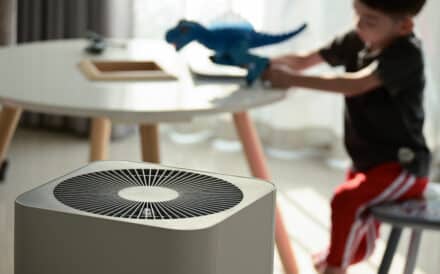How to Spring Clean Your HVAC System In 2022

Spring is officially upon us, and for many people, this means that it’s time to once again work on maintenance and repair tasks around the house that often go neglected throughout the holidays and during the cold winter months. When planning for spring-cleaning, most homeowners prioritize dusting their home, deep cleaning their kitchens, and sorting through their closets to find stuff to donate; however, not many people put their HVAC system on their spring-cleaning list. Yet, with summer right around the corner, you will soon be turning on your air conditioner for the season, and spring-cleaning is the perfect opportunity to get your system tuned up to ensure it is ready to handle the hot summer months ahead.
Spring is the perfect time to make sure that your air conditioner is up to the task of keeping you and your family comfortable this summer as it allows you to identify any potential problems with your system and perform necessary repairs now before the heat of summer arrives. To help ensure that your HVAC system is summer-ready, keep reading for a few HVAC spring-cleaning tips.
Change Your Filter
The first thing that should be on your spring-cleaning list is to change your HVAC system’s air filter. While your air filter plays a critical role by helping to trap contaminants in the air and prevent them from being spread throughout your home by your HVAC system, it is also easy to forget to change your filter as often as you should. Try to make a point of setting a reminder for yourself so that you remember to change your filter as directed by your manufacturer’s instructions. As a general rule, you will want to change your filter at the start of each season (roughly every 90 days), however, each system and filter type has different requirements. If anyone in your home has allergies or suffers from asthma, you may want to consider replacing your filter monthly to keep the air in your home as clean as possible.
In addition to keeping the air in your home clean, replacing your air filter this spring is also critical in helping to ensure that your air conditioner runs as efficiently as possible. When your air filter is dirty, your HVAC system will have to work harder to heat/cool your home. Not only will this consume more electricity, but it will cause additional wear and tear on your HVAC system’s components, which could increase maintenance and repair costs.
Clean Your Registers and Return Air Vents
As part of your whole-home spring-cleaning, make sure that you dust/clean your HVAC system’s registers and return air vents. Return air vents are notorious for accumulating a lot of dust and dirt as air passes through them. However, this can cause your return vents to become obstructed, making it harder for your HVAC system to run. Taking the time to use a rag or vacuum to remove any buildup on your return registers can help improve your system’s energy efficiency and reduce the amount of dust and allergens entering your HVAC system.
Even if you make sure to clean your return air vents and change your air filter, your HVAC system could still be blowing dirty air throughout your home if your registers are dirty, which they likely are after your home has been closed up all winter. Fortunately, cleaning your registers is as easy as removing them from the vents and washing them with warm water and mild soap.
Clean Around The Outdoor Unit
Essential to HVAC spring-cleaning is making sure that your exterior HVAC unit is clean and free from debris, as it is likely that dirt, leaves, twigs, and other debris have built up around it during the winter months. Any debris accumulating or plants growing near your exterior HVAC unit needs to be cleared away in order to ensure proper performance. Make sure to clear away leaves, mulch, soil, twigs, and rocks that have accumulated on/near your HVAC unit, and trim any plants and bushes that have begun to encroach upon it. Ideally, you should have at least a two-foot clearance around your unit that is free from plants and debris in order to ensure maximum airflow.
Perform a Test Run
Once you have taken the time to make sure that your HVAC system is clean and ready for summer, you should perform a test of your air conditioner. The fact is that your air conditioner has likely sat dormant throughout much of fall and winter, and you will want to make sure that everything is still functioning properly before the heat of summer arrives. The last thing that you want to have happen is for a particularly hot day to arrive only for you to discover that your air conditioner isn’t working.
During your spring-cleaning, you should then turn your AC on and perform a test run of your system. After your air conditioner has been running for a few minutes, check to see if cool air is circulating throughout your home. If it isn’t, you will need to have your HVAC system inspected and repaired before summer arrives. Even if everything seems to be working fine, let your system run for a while and listen for any strange or unusual sounds that could indicate impending problems with your air conditioner. Taking the time to do this now will ensure you aren’t caught off guard when summer arrives.
Schedule Your Annual AC Service
Of course, one of the most important things that you should have on your HVAC spring-cleaning checklist is to schedule your annual AC tune-up. Having your air conditioner serviced annually is critical in order to ensure everything is running properly and that your system is up to the task of keeping you cool all summer long. Additionally, having your air conditioner serviced each spring allows an experienced HVAC technician to inspect your system for signs of potential problems that may need to be repaired. Having your air conditioner inspected before summer arrives will help ensure that your system can keep up during the hot months to come without breaking down when you need it most.
Feel free to contact us for additional HVAC spring-cleaning tips as well as to learn more about the importance of having your air conditioner serviced this spring.




